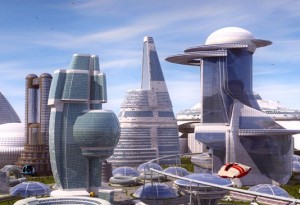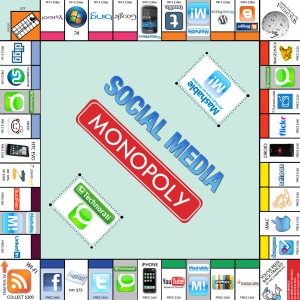 Trying to imagine what the future will look like can make your brain wibble-wobble in all sorts of uncomfortable ways.
Trying to imagine what the future will look like can make your brain wibble-wobble in all sorts of uncomfortable ways.
For some reason when people envisage the future, cities looks quite like they do now but they’re curvier and have random flying pods zooming about.
Everything is also crystal clean sparkly clear and the air is somehow fresher, brighter, sharper than it is when you look out the window (not sure how that will happen but here’s hoping) – or else we’ve been through some kind of armageddon and everything looks vaguely like it did during World War 2…
Given that we can only speculate, here are a few questions to get your idea juices flowing…
On a global scale:
- Will we end up zooming around in hovercrafts?
- Will the ice caps melt?… and will Ireland drown as corresponding sea levels rise?
- Will solar, wind and wave technology finally free us from our dependance on fossil fuels?
- Will medical advances allow us to grow spare body parts? And will we be able to select the genes our children inherit? Perhaps we’ll even be able to ‘transplant’ our brains into a new body and thus find a way to live forever!
- Will the threat of nuclear annihilation re-imerge? Will religious fundamentalism lead to the break-out of a global jihad between Muslims and Christians? Will ‘the Hunger Games’ ever come to pass? It may sound crazy but pick up a copy of Orwell’s 1984 and you’ll see just how much big brother’s already come to pass!
- Will robots finally do our housework for us? (please let the answer to this one be yes…)
- Will we find a way to populate other planets? Holidays on Mars anyone? Underwater cities? There are 7 billion of us on earth now after all. That’s a whole lotta peeps for one planet…
On a personal level:
- What will your life be life? What will you spend your time doing?
- What will you achieve?
- Will you make the world a better place? Or a worse one? Or have no effect on anything!
- Who do you picture IN your future with you?
I’m particularly taken by the idea of augmented reality which isn’t far in the future – check these out:
http://www.youtube.com/watch?v=6Cf7IL_eZ38
http://www.ted.com/talks/pattie_maes_demos_the_sixth_sense.html
http://www.youtube.com/watch?v=a6cNdhOKwi0
http://www.youtube.com/watch?v=9c6W4CCU9M4
Also, if you’re not doing the Leaving Cert until next year I recommend you read “An Optimist’s Tour of the Future” by Mark Stevenson over the summer. If you like reading that is…which I’m presuming you do if you browse this website for shits and giggles!!!






